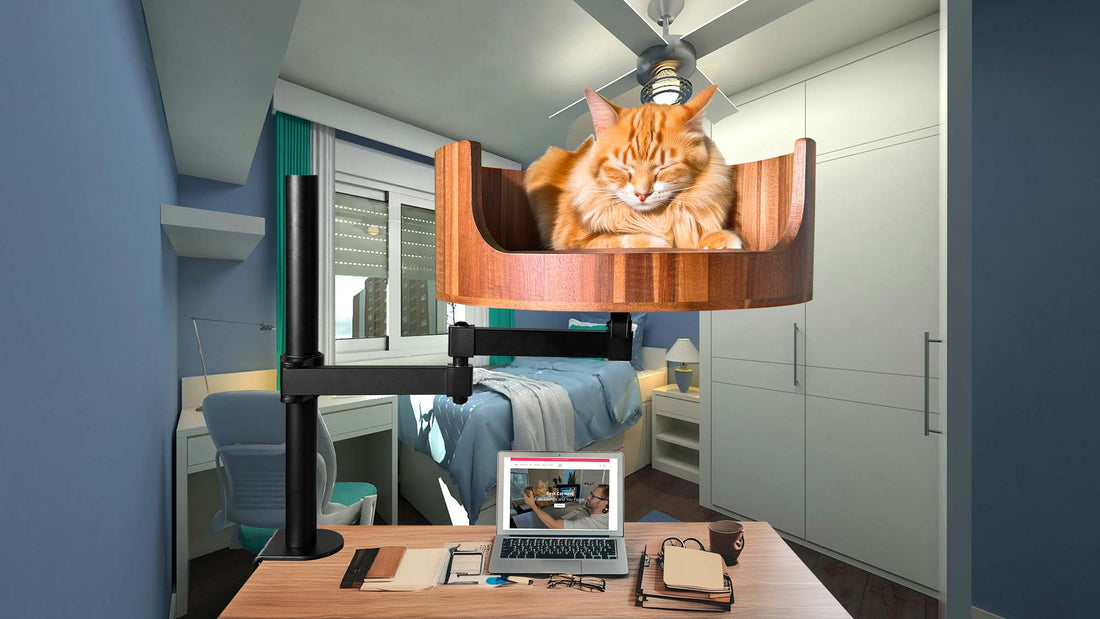
Why Do Cats Eat Cardboard? Understanding This Behavior
Share
If you have a cat, you may have noticed that they have a strange affinity for cardboard. Whether it's scratching, biting, or even ingesting it, many cats seem to be inexplicably drawn to this seemingly mundane material. At Desk Cat Nest, we understand this behavior can be both confusing and concerning for cat owners. That's why in this article, we will delve into the reasons behind why cats eat cardboard and provide insights into understanding this peculiar behavior.
Cats are known for their curious and sometimes quirky behaviors, but eating cardboard may leave many owners scratching their heads. While it may seem harmless at first, ingesting cardboard can actually pose health risks to your feline friend. In this article, we will explore some of the potential reasons behind why cats eat cardboard, including potential nutritional deficiencies, natural instincts, and even stress or anxiety. By understanding the motivations behind this behavior, you can better address your cat's needs and ensure their well-being. So, if you've ever wondered why your cat enjoys chomping on cardboard boxes, keep reading to gain a deeper understanding of this fascinating feline behavior.
1. Cats may eat cardboard due to a variety of reasons, such as seeking fiber, playfulness, or stress relief.
2. Cardboard can provide a safe and appealing nesting material for cats, creating a cozy and secure space for them.
3. It is important to monitor your cat's cardboard consumption to ensure they are not ingesting harmful chemicals or materials.
4. Providing alternative enrichment activities, such as interactive toys or scratching posts, can help redirect your cat's behavior away from eating cardboard.
5. Understanding your cat's individual needs and preferences can help prevent unwanted behaviors and promote their overall well-being.
## Reasons Why Cats Eat Cardboard
Cats may eat cardboard for a variety of reasons. One common explanation is that cardboard provides a rough texture that helps to maintain their dental health. Chewing on cardboard can help cats remove tartar and plaque from their teeth, similar to how chewing on toys or sticks can do the same. Additionally, cardboard fibers may provide a satisfying sensation for cats' mouths, especially if they are teething or have gum inflammation. Some cats may also eat cardboard out of boredom or as a way to alleviate stress or anxiety. In these cases, providing more mental and physical stimulation through interactive toys or playtime can help curb the behavior.
## Risks of Cats Eating Cardboard
While eating cardboard may seem harmless, there are potential risks associated with this behavior. Cats that ingest large quantities of cardboard may suffer from gastrointestinal blockages, which can lead to serious health issues or even be life-threatening. Cardboard is not easily digestible and can cause obstructions in the intestines if consumed in large quantities. Symptoms of a gastrointestinal blockage in cats include vomiting, diarrhea, lethargy, and loss of appetite. If you suspect that your cat has ingested a significant amount of cardboard and is showing any of these symptoms, it is crucial to seek immediate veterinary care.
## How to Prevent Cats from Eating Cardboard
Preventing cats from eating cardboard can help avoid the risks associated with this behavior. One effective method is to provide alternative chewing options for your cat, such as cat-safe toys or dental treats. By offering more appealing alternatives, you can redirect your cat's chewing behavior away from cardboard. Additionally, ensuring that your cat has enough mental and physical stimulation through playtime, scratching posts, and interactive toys can help prevent boredom-induced cardboard consumption. If your cat continues to show a strong preference for chewing on cardboard despite your efforts, it may be helpful to consult with a veterinarian or animal behaviorist for further guidance on how to address this behavior.
Frequently Asked Questions about Why Cats Eat Cardboard
Why do cats eat cardboard?
Cats may eat cardboard for various reasons, such as boredom, pica (a compulsive disorder characterized by eating non-food items), or simply out of curiosity. It may also help to satisfy a cat's natural instinct to chew on rough surfaces, which can help maintain their dental health.
Is it safe for cats to eat cardboard?
While ingesting small amounts of cardboard may not harm most cats, consuming large quantities can lead to gastrointestinal issues such as blockages or obstructions. It's best to discourage this behavior and provide alternative enrichment options for your cat.
How can I prevent my cat from eating cardboard?
To prevent your cat from eating cardboard, provide them with plenty of mental and physical stimulation through toys, interactive playtime, and climbing structures. Additionally, make sure to keep cardboard boxes and other tempting items out of reach to discourage chewing.
Should I be concerned if my cat frequently eats cardboard?
If your cat is regularly consuming cardboard or other non-food items, it's essential to consult with a veterinarian to rule out any underlying medical conditions or nutritional deficiencies. Your vet can offer advice on how to address this behavior and ensure your cat's overall well-being.
In conclusion, providing your cat with a Desk Cat Bed is a valuable choice to help prevent them from eating cardboard. Not only does the Desk Cat Bed offer a comfortable and safe space for your feline friend to rest and play, but it also serves as a better alternative to cardboard that can pose health risks. By investing in a Desk Cat Bed, you can ensure that your cat's urge to chew on cardboard is redirected towards a more suitable and beneficial option. Pamper your pet with a stylish and functional Desk Cat Bed today, and say goodbye to cardboard munching for good.



















































